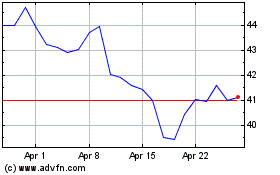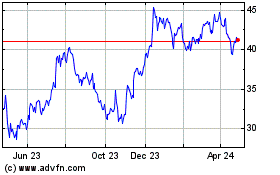U.S. Bancorp Is Charged, Fined in Laundering Case -- WSJ
February 16 2018 - 3:02AM
Dow Jones News
By Christina Rexrode
This article is being republished as part of our daily
reproduction of WSJ.com articles that also appeared in the U.S.
print edition of The Wall Street Journal (February 16, 2018).
U.S. Bancorp was fined $613 million Thursday for what regulators
and prosecutors said were shoddy anti-money-laundering controls, a
rare regulatory setback for a bank that emerged from the financial
crisis relatively unscathed.
The U.S. attorney's office in Manhattan also announced criminal
charges against the bank that eventually could be dismissed. The
Manhattan U.S. Attorney, Geoffrey Berman, said the bank's poor
controls had allowed a former customer, race-car driver Scott
Tucker, to launder money from an illegal payday-lending scheme. Mr.
Tucker was convicted of fraud last year.
Banks are required to have controls to prevent their systems
from being used for illegal purposes, and to report suspicious
activity to the government. But the government said that U.S. Bank
had operated its program "on the cheap" with inadequate staffing
and resources, which caused it to miss red flags of some of its
customers' activities, including Mr. Tucker.
Minneapolis-based U.S. Bank is the largest among mid-sized U.S.
banks, and one of the largest banks in the country. It has long
cultivated a reputation for a cautious, plain-vanilla approach to
banking, which has produced years of steady profits. The
settlements announced Thursday represent its biggest regulatory
fine ever.
Investors took the news in stride. Shares fell 0.4%, or 21
cents, to $55.10. The bank already had disclosed that prosecutors
were looking at its relationship with Mr. Tucker. Bank executives
said last month that they were expecting a settlement soon, and had
set aside $608 million. The bank said Thursday it was fully
reserved for the settlements.
Still, U.S. Bank can't put the matter behind it just yet. The
bank is still subject to a 2015 consent order by the Office of the
Comptroller of the Currency, which flagged the bank for
anti-money-laundering deficiencies, and the Federal Reserve issued
a similar consent order on Thursday. The OCC order constraints U.S.
Bank from buying other banks.
Also, the bank's agreement with the Justice Department includes
a so-called deferred prosecution agreement, which requires it to
submit to further monitoring. In exchange, the government could in
two years seek to dismiss the charges. The bank has already been
revamping its money-laundering programs since the OCC's consent
order, by hiring staff, upgrading systems and installing a new
leadership team.
"We regret and have accepted responsibility for the past
deficiencies in our (anti-money-laundering) program," said U.S.
Bancorp's Chief Executive Andy Cecere, in a statement. A longtime
U.S. Bank executive, he became CEO last year.
The bank agreed to a statement of facts about its conduct.
"This order ... shows that career examiners and prosecutors
remain at work," Cowen & Co. analyst Jaret Seiberg wrote in a
note to clients.
A customer at the center of the investigation was Mr. Tucker.
According to prosecutors, from 2011 to 2013, the bank failed to
appropriately report that Mr. Tucker had been using sham bank
accounts opened under the names of companies connected to Native
American tribes. Prosecutors said the bank disregarded numerous
warning signs that Mr. Tucker was using the tribes to hide his
ownership of the accounts. For example, prosecutors said, Mr.
Tucker used money from the accounts for a vacation home in Aspen
and his professional Ferrari racing team.
After news reports of Mr. Tucker's questionable business
practices in 2011, U.S. Bank closed the accounts but didn't file a
suspicious activity report, prosecutors said. It also left open
other accounts belonging to Mr. Tucker.
Prosecutors said the bank dealt with its thin resources in
anti-money-laundering compliance by capping the number of
transactions subject to review. The bank then concealed that method
from the OCC, prosecutors said, with one employee excluding
references to limited resources from the minutes of an internal
bank meeting.
In all, the bank announced settlements or agreements with the
Justice Department, the OCC, the Fed and the U.S. Treasury's
Financial Crimes Enforcement Network.
The fines and penalties included a forfeiture of $453 million
related to the Justice Department agreement, a $15 million penalty
from the Federal Reserve, a $75 million penalty from the OCC, and a
$70 million penalty from FinCEN.
Write to Christina Rexrode at christina.rexrode@wsj.com
(END) Dow Jones Newswires
February 16, 2018 02:47 ET (07:47 GMT)
Copyright (c) 2018 Dow Jones & Company, Inc.
US Bancorp (NYSE:USB)
Historical Stock Chart
From Mar 2024 to Apr 2024

US Bancorp (NYSE:USB)
Historical Stock Chart
From Apr 2023 to Apr 2024
